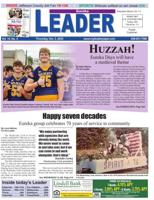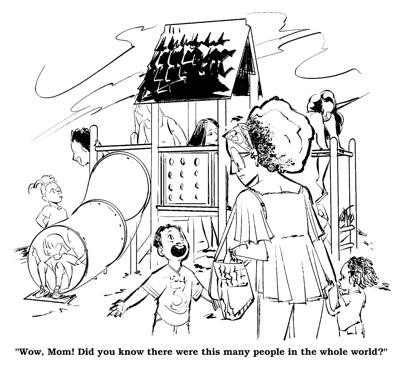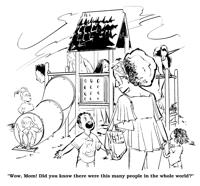When the coronavirus pandemic hit, the world seemed to somehow shrink, growing ever smaller, as we huddled in our homes, avoiding contact with anyone outside our small family circles.
A year and a half later, it is starting to feel like a glorious reawakening, as the vaccinated venture cautiously forth to begin taking up some of our pre-pandemic pursuits and pleasures.
For us grownups, it’s a comforting return to normalcy. The world we know, the things we’re used to, are returning and things are starting to feel right-side-up once again.
For us, the coronavirus and its effect on the world has meant a radical departure from the norm, and there is palpable relief in the idea of beginning a gradual return.
But for little folks, it’s a very different story.
My twin grandchildren were just past their second birthday – shoot; they didn’t even have all 20 of their baby teeth yet – when the lockdown came.
Now approaching age 4, they have no memory of strolling through a store, dining in a restaurant, attending a concert or a movie theater.
They have spent 40 percent of their short lives under house arrest, seeing and interacting with no one but the members of our household.
And now, we’re poised to take them by the hand and say, “Come with us – we want to show you a completely different universe than the one you’ve grown used to.”
Author Emma Donohue wrote a terrific and insightful book (also made into an Academy Award-winning movie) called “Room,” which told the story of a young woman kidnapped and held captive for seven years. During her confinement, she gives birth to a child and raises him in the cramped, 12-by-12-foot space.
When he turns 5 years old, she tricks her captor into thinking the child is sick in order to effect their escape, and the rest of the book deals with their return to society and the boy’s introduction to the world.
The interesting twist is while she was captive, the mom chose not to tell her child about anything outside their room. Rather, she helps him create a rich fantasy world full of love, laughter and imagination. For five years, he has lived contentedly in that tiny world while she has relentlessly sought to escape it.
When they get out, she feels relieved that she never has to go back; he feels confused and threatened and wants nothing more than to return to the safety of the only home he ever knew.
Is that how little ones might feel these days?
Will toddlers cringe at the sight of an unmasked face? Will kindergartners be reluctant to hold hands for “Red Rover?”
For me, the scents of elementary school are chalk dust and mimeograph ink. Will the scent of hand sanitizer be the olfactory memory these little people carry into adulthood from their young years?
To them, this whole thing can’t feel like a return to normal; they can’t miss what they never knew they had. It must feel more like an upheaval. Let’s face it: As far as they’re concerned, isolation and masking and never touching other humans is “the way we’ve always done it.”
One of the first times the twins were out of the house since March 2020 was their brother’s kindergarten graduation in late May. They wore masks and were seated in a socially distanced “pod” with their parents, but they were absolutely goggle-eyed at having actual live people around them in the gymnasium.
It was the first time they had been in the same room with anyone but their parents and grandparents in 15 months, and they were a bit overwhelmed.
Can you blame them?
Luckily, they’re young enough to assimilate change pretty easily. It won’t be long before they’re rollicking around the preschool playground, doing all the carefree, goofy stuff little kids have been doing since the dawn of time.
But in the meantime, hopefully we can all be empathetic toward their situation. Hopefully, we can all try to understand what it’s like for people whose perspective about the events of the last year and a half has been different from our own.
It’s been a rough 18 months, folks; let’s get back out on the playground as quickly as we safely and kindly can – and let’s do it together.





